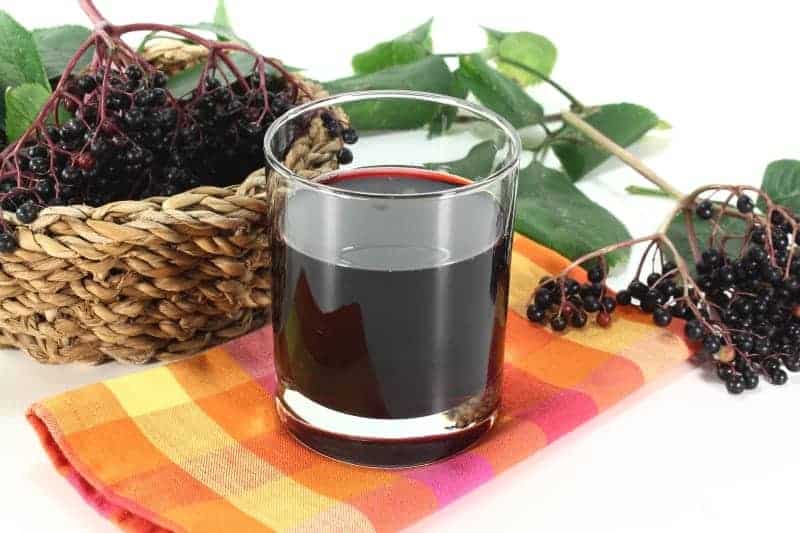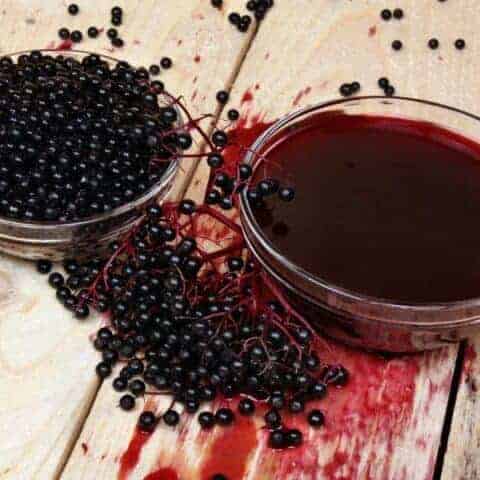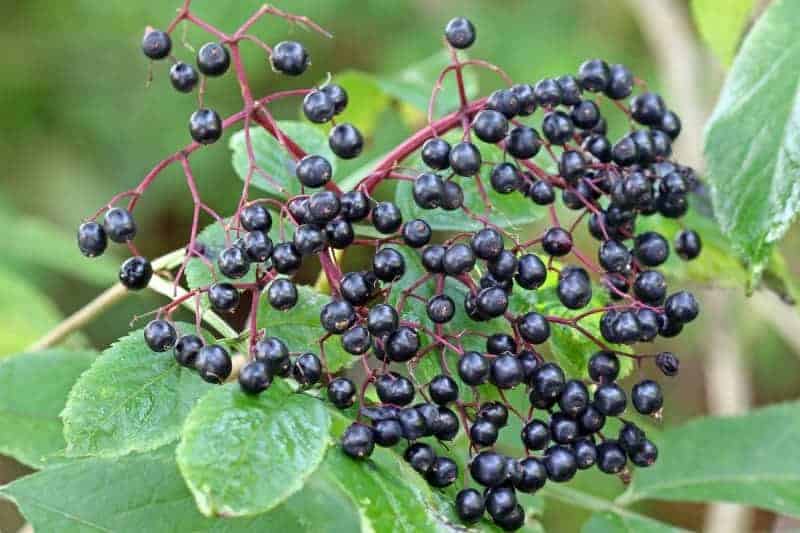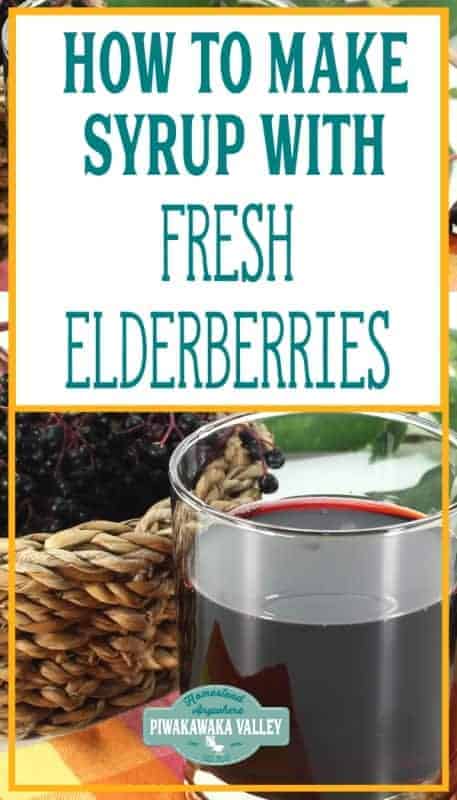Elderberry syrup is an age old traditional recipe to help boost the immune system and fight off cold and flu viruses. This folk remedy is finding a great increase in popularity again as more and more people are turning back to more natural methods to fortify their body and stay healthy.
Can you use fresh elderberries to make elderberry syrup?
Yes you can! Elderberries lose 80% of their weight when you dehydrate them, so to adapt a recipe to using fresh elderberries you will need to divide the required weight of dried elderberries by .2, this will give you the fresh weight. You will also need to reduce the amount of liquid in the recipe by the difference in weight (g) in milliliters (mls)
Please read: This information is provided for educational purposes only and is not intended to treat, diagnose or prevent any disease. We encourage you to make your own health care decisions in partnership with a qualified health care professional.
This post contains affiliate links, this means at no extra cost to you, we make a commission from sales. Please read our Disclosure Statement
So for example – if a recipe required 100g of dried elderberries, you divide 100g by .2
100/.2= 500g
You will need 500g of fresh elderberries.
The recipe also might ask for 4 cups of water or 1000ml. 500g minus 100g = 400g. Swap the g for ml and you need to use 400ml less water than the recipe requires. OR you can use the recipe below for elderberry syrup made with fresh berries that I have already done the math for you!
RELATED POST: how to dry your own elderberries
What are the benefits of elderberry syrup?
Note: I am not a doctor, please talk with your doctor before starting any plant or herbal based preparation.
Elderberry syrup has been shown in clinical studies to both block the entry of the influenza virus in to the cell, and also once it is there, inhibit the virus from replicating. (1, 2)
In practice they found in a several double blind trials that taking the correct dose of elderberry syrup also reduce the length of the flu by 4 days on average. (1, 2 , 3)
Is Elderberry safe? I thought it was poisonous?
The elderberry plant contains a cyanogenic glycoside sambunigrin (1) which must be deactivated by heating before you eat or drink elderberry.
A cyanogenic glycoside contains a cyanide group attached to a sugar. When digested, it is released, and can harm the body. This is much more concentrated in the stems, bark, leaves and seeds of the berries, less so in the flesh or juice.
Elderberries also contain an alkaloid called sambucine which causes nausea and vomiting if you eat it.
Because these components are easily deactivated through heat, we are able to produce a finished product that does not contain any of the dangerous types of alkaloids or glycosides.
However, this also means that the berries should not be used in a tincture, glycerite, or other uncooked preparation.
RELATED: How to propagate your own elderberry bushes
Who should not take elderberry syrup?
Elderberry syrup is considered a culinary herb, meaning it is used often as food sized doses without any health concerns.
This being said, when the dosage is increased to therapeutic levels, some people may experience negative effects.
Elderberries boost your immune system function, so it can also interfere with immune suppressing drugs.
As elderberry can increase levels of cytokines in some people, prolonged, large medicinal doses should be avoided by those who have autoimmune conditions.
Elderberries can also have an diuretic effect, so they could increase the effects of pharmaceutical diuretics in some people.
Generally, for most people elderberry is considered safe, and the prevention dose below falls into the culinary herb range of dosing, it is not until you start taking it several times per day does it cross over into the therapeutic dosing range. Please check with your own doctor before starting any herbal preparations.

What is the right dosing of elderberry syrup? How do you use elderberry syrup when you are sick?
The average dose used in studies to treat viral infections is 15ml or one Tablespoon of a syrup with 38% elderberry, 4x a day for adults and the same amount at a 19% concentration for children or half the adult dose in mls.
Commercial preparations of elderberry syrup are often much less potent than those used in clinical studies, but I have made the recipe below to this strength.
This recipe below produces 35 adult doses, so to be accurate, measure the total volume you have at the end of the second boiling and divide that by 35 to give you your single dose volume. If you simmer it down to 2 cups/500ml total, then your adult dose will be 15 ml or 1 Tablespoon as stated.
For active infections, an adult could take a full dose every 2-3 waking hours for up to 4 days. For cold or flu prevention, you do not need to do this so much or as often. One tablespoon once per day for adults is enough as a prevention.
How much elderberry syrup do I take then?
The general suggested doses are as follows:
Adults when well – 15 ml or one Tablespoon once per day
Adults when unwell – 15-30 ml every 2-3 hours when awake or 4-5 doses per day
Children when well 7.5 ml or 1.5 teaspoons per day
Children when unwell 7.5-15 ml or 1.5 teaspoons – 1 Tablespoon every 2-3 hours when awake or 4-5 doses per day.
Because elderberry is a food, it is unlikely that you will take to much of it, with this amount of boiling the cyanogenic glycoside is removed so it generally considered safe to take.
How to make elderberry syrup using fresh elderberries recipe
500g fresh elderberries (or 100g of dried elderberries plus additional 400 ml water)
3 cups / 750 ml of water
12g or 2 Tablespoons of ground dried ginger root
2g or 1 teaspoon ground cloves
1 1/2 cups of honey (or brown rice syrup) or 1 cup of honey and 1/2 cup of sugar
In a pot on the stove boil your elderberries, water, and spices for 30 minutes. Mash the berries to release their juices and stir them regularly during this time.
Tip the berries into a sieve over a bowl and use the back of a ladle to squish out all the liquid as best that you can.
Measure this liquid and if required top it up to 2 cups with additional water
Return the liquid to the pot and add the honey
Boil for a further 10 to 15 minutes or until it has reduced back down to 2 cups of liquid.
While it is boiling, place clean glass bottles in the oven at 100C (40F) for 10 minutes to get hot and sterilised and boil your lids for 5 minutes.
Use a funnel pour your liquid in to the hot bottles and add their lids.
If you want this mixture to be shelf stable for more than a month then you should water bath them by filling a tall pot with enough water to cover the bottles plus an inch, place a rack in the bottom of the pot and bring it to the boil.
Carefully add your hot bottles and simmer them for 15 minutes, remove and cool on a folded towel until totally cold.
Store open bottles in the fridge.
Delicious elderberry syrup made with fresh elderberries In a pot on the stove boil your elderberries, water, and spices for 30 minutes. Mash the berries to release their juices and stir them regularly during this time. Tip the berries into a sieve over a bowl and use the back of a ladle to squish out all the liquid as best that you can. Measure this liquid and if required top it up to 2 cups with additional water Return the liquid to the pot and add the honey Boil for a further 10 to 15 minutes or until it has reduced back down to 2 cups of liquid. While it is boiling, place clean glass bottles in the oven at 100C (40F) for 10 minutes to get hot and sterilised and boil your lids for 5 minutes. Use a funnel pour your liquid in to the hot bottles and add their lids. If you want this mixture to be shelf stable for more than a month then you should waterbath them by filling a tall pot with enough water to cover the bottles plus an inch, place a rack in the bottom of the pot and bring it to the boil. Carefully add your hot bottles and simmer them for 15 minutes Store open bottles in the fridge. It is important that this syrup is cooked for at least 30 minutes in the first boil. Depending on altitude, humidity and other factors, 3 cups/750ml of water may not be enough to cook for the required length of time without burning the berries. Adjust the initial water measurement as needed to ensure that the final result is 2 cups of extract per 500g of fresh elderberries after having been cooked for 30-45 minutes and thoroughly strained.
Elderberry syrup using fresh elderberries
Ingredients
Instructions
Notes


